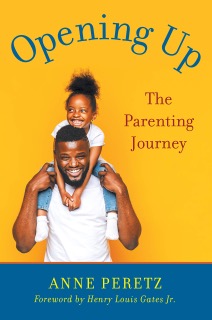Opening Up: The Parenting Journey by Anne Peretz (Radius Book Group)
This is not a book about mental health disorders. It is not a book about classifying and medicalizing distress. It is not a book about doctors, or diagnosis, or treatment — not in any usual sense.
 Instead, it’s a book about families.
Instead, it’s a book about families.
Anne Peretz’s slim, resonant, plainspoken, and persuasive work is her first-person history of founding and shepherding Parenting Journey, a radically non-judgmental, evidence-based approach to helping families — low-income, urban, and marginalized communities of color most of all — as they strive to understand and respond to their own struggles, strengths, and journeys forward. It offers glimpses into the program’s early case studies and success stories in the Boston area and accounts of its growth over the years into a sprawling international presence with more than 500 locations.
Beyond history, the book is also a credo, a call for social justice, and a testament to the power of listening to those in need — and an appeal to see them through a lens of learning and compassion, especially in the context of inequality, race, and systemic pain. As Peretz says at the top of her author’s note: “This is a book about stories.” At the same time, it’s a book about storytelling itself, as families are urged to recognize their own strengths and create new narratives — more healing and empowered ones — on the path ahead.
Often, the families brought to life in Opening Up suffer under the weight of buried or unspoken trauma. In one of the book’s first stories, a 13-year-old boy named Billy threatens to jump off a roof. In some other context, through some other lens, he might be shunted into the system, his family irreparably torn. In this one, facilitators engage family members in conversation, finally teasing out the truth: The boy’s sister is being sexually abused by their mother’s boyfriend. The mother, unaware of the abuse, is urged to contact social services herself to report her boyfriend, thus preventing the removal of her children and the breakup of the family. What’s more, Billy reveals that a local gang had been pressing him to join. He didn’t want to. He went up to the roof instead.
As Peretz writes: “Symptoms are signs of distress, and in this case, the startling, attention-getting symptom was Billy threatening to jump off the roof. But what was it a symptom of? A bipolar disorder? A signal to the world that his family was in trouble and needed help? A cry for help in a community where he was trapped between two bad choices? How we understand the meaning of the symptom will prescribe what line of intervention to take. And how we see the symptom will depend on where we choose to look.”
In the pages that follow, Peretz tells more stories of “symptoms” pointing to layers upon layers of unearthed family anguish going back years, decades, generations. She tells of profound emotional revelations teased out in groups through humor and creativity, the truth emerging via sculpture, scribbled-out secrets, or community-staged soap operas.
She also lays out the philosophical and therapeutic underpinnings of the approach, citing David Kantor and Salvador Minuchin as influential trailblazers whose work exploring identity and family proved foundational. Specifics on Parenting Journey’s structure and practices are outlined in a brass-tacks, informative appendix, which also tips readers to research showing the program works: In one randomized, controlled study, its participants showed statistically significant declines in stress.
But the heart of the book lies, again, in its stories — sagas of brokenness and resilience that resound with humanity. Peretz, an artist and family therapist with decades of experience, fills her small volume with many tales, simply told with little or no psychotherapeutic jargon and no agenda beyond an entreaty to question, and change, the existing approach. She criticizes the current model of social work, which too often fails to see the broader family picture — or even consider that there is a broader picture — and instead parcels out problems into discrete “silos,” aiming to “fix” them in narrowly defined, inflexibly sanctioned ways. Addiction is one silo. Domestic violence another.
So a 12-year-old girl who bursts into rages at school? She winds up diagnosed with an anxiety disorder. Her name is Maria, and Peretz delves into the real complexity of her story: At home, she helps parent her two younger siblings. She’s quiet. Docile. Helpful. Her overwhelmed mother, it turns out, endures her own torment both physical and emotional.
“Viewing Maria and her family through a systemic lens, a caregiver might want to rethink the original diagnosis and instead choose to see a contextually complex situation, rife with pain and bravery,” Peretz writes. As with Billy, Maria’s extreme behavior “was a rather ingenious way of calling attention to what actually needed attending to in her family.”
Opening Up doesn’t suggest all endings are tidy, or that every challenge can resolve with daisies and buttercups. But as Henry Louis Gates, Jr., says in his foreword, the book argues for “a fundamental shift in focus from traditional therapeutic modalities to open, respectful relationships” between those in need and those who help them. Therapists can learn from families; families can learn from themselves. The crux of it is a recognition that things can change — that trauma can be acknowledged, that dialogue can start, that people can heal when it does.
Peretz calls this “a belief in the possibility of a better life,” a phrase she uses in a moving account of the program’s affiliate in Burundi (named, not coincidentally, Opening Up). After years of genocide, poverty, hunger, and — as she learns — domestic abuse, the community opened itself to hope. And hope is the key.
“They believed something could be different,” she says, “and were willing to give it a try.”















Good article Amy. So very healing for many.
I remember my spirit guide saying this…
“All parents are creepy”.
I laughed but I knew it was said with rueful affection about human foibles.
It was meaning that the job of parenting is creepy.
Nobody teaches a parent what to do or who to be for their child. A child at age two is a different species to a child aged twelve. The rattle that worked for a bundle of joy of nine months probably won’t work for a seven year old astronaut.
I heard once that pregnancy is a count down process of regression. At the time that the embryo is no bigger than a mote on a contact lens the mother begins to regress from being a perfectly sensisible adult person to who she was in her nervous teenage years. As the embryo grows more like a shrimp with bug eyes the mother regresses to growing younger in temperament. She becomes unrecognizable to her partner not only in physical form but in personality. At seven months pregnant she cries at the slightest thing. As the foetus matures it becomes more acrobatic and nuanced and feeling. By the time the mother is nine months huge she is an emotional blubbering wreck of mangificent emotions. At birth her emotionality is like that of a giant toddler, and this is what hugs the emotional baby, in a emotional chorus of wailing. The mother, and lets not leave out the father, regress to becoming as sensitive as the baby, so that there is a common language and understanding. You could say it is like learning French for nine months in order to welcome a house guest. One that never leaves….
One that by all accounts grows much more mature than the toddlerish rattle waving parents in the blink of an eye.
Then there is society. Society has a lot to say to parents, the emotional wrecks who have no handbook or instructions on how to turn a rattle into a reputation on a collage campus that will guarantee instant popularity.
Then along cometh climate change to sink the ship entirely. Previously a few sketchy dreams could have won the day. Go to school and rescue your childhood with a tenth rate career at least. But suddenly careers look like so much fiddling while Rome puffs to cinders. So what was the damn point of maternal emotional regression or paternal emotional regression to welcome the bright new bawling hope in the future. What future?
But there is always a future. It just may not be full of fine weather.
We can all cry about it. And cry we must. Crying is natural. But so is the will to live. As is seen in certain animals that live in wild climates.
Report comment
Thank you! And regarding the mind- and mood-altering nature of parenthood, I love your observation: “You could say it is like learning French for nine months in order to welcome a house guest.”
As I’ve often remarked to friends, having a kid feels like “Invasion of the Body Snatchers.” Becoming a parent changes everything. There’s no going back to your previous frame of mind; how you see and relate to the world is permanently altered. Not just at your child’s birth. Forever. Or, to use your analogy: You never stop speaking French.
But I think the fascinating and important piece of Anne Peretz’ work is acknowledging that even so — especially so — parents are still carrying the weight of their own stories and trauma. Understanding our own narratives can only help us with our children moving forward.
Report comment
Thank you for your warm reply. I am honoured.
I am agreeing however, most parents in the boomer generation got drowned in trauma unearthing therapy. Trauma hunting is not new. It is not a new revelation at all. Recall primal scream groups? Even Freud explored trauma. There seems to be an evangelical need to believe in the myth of the undamageable person, the person we should all be. The myth of the perfectly grinning perfect fixed model specimen of humanity. Everyone is encouraged to think they can aspire to be who they “should” be. Just like in a previous century people were schooled to want to be career minded or married or a fine citizen. An evangelical fervour that sweeps into a society an encourages the very opposite of self acceptance. Suddenly everyone has to roll up and enroll in character building trauma care courses designed to rehabilitate them out of madness and back into being understood. Mischief is afoot. Anything that reeks of salvation is probably the opposite.
Sure everybody wants to be a bit happier but in my experience staying resolutely possessed of beautiful madness is actually the quickest short cut way to finding it.
I am not sneering at the many canvas marquees of trauma care that like baptismal road tours are popping up left right and centre. The more choices people have the merrier.
I am just not convinced that it is the only answer. Civilization has already put a couple of generations through trauma bible courses already, and what has come of it? Last month three teenage girls hospitalized a sixty year old granny just because she was waiting for a bus. I will hazard a guess that the parents of those darling children had given their offspring a respectable good enough quota of cuddles and birthday cards.
The Emporer standing nudely is that we have had two years of the most horrendous global TRAUMA in the nightmare of a pandemic that threatens to suffocate the human species and yet NOBODY is wandering the streets wailing and sobbing and emoting about it. That is because everyone is avoiding facing the colossal trauma that is governing everyone’s moments and choices right down to whether a needle mean death or death without the needle. Everyone is living through their own private hell as if on Death Row every day and NOBODY is tearing up about the brutality of having to endure such unendurableness. Instead everyone is going shopping for a “new me”.
Everyone is going on bloody buses to catch up with the evangelical music emanating from the touring trauma fixing tents. This is in the desperate belief that by getting rid of the old self one might give misery the slip, like a snake shedding its skin. But this “getting rid of” defence mostly IS the trauma doing its worst. It causes an overwhelming want of an out of body jump into a brand new life. Whereas a better way may be found in re-loving the damaged old self.
There is a lot of noise to change going on in society. Everyone right down one’s pet budgie “has to change”. Everyone is being cajoled and bullied into being other than who they really are. Everyone is told this will redeem them and if they are redeemed it will heal them and heal society. But the flipside of that is that if you refuse to change you are traumatizing society.
When the chickens come home to roost we may see children taught that if they do not change to the new evangelism then they are deliberately traumatizing the world.
As messages go….now that one is traumatizing.
Report comment
I had the good fortune to be supervised by a few of wise family therapist, Rob Marx and Claire Robitie and Dave Grove. They taught me that parents should be respected for the challenge of raising a family and they deserved to be understood in context of those challenges. The first session was about discussing the family strengths, and all of the things parents had tried to do to solve the problem. They were affirmed for their hard work. If a child needed to be redirected in the session the parent was asked to do it, with a view towards complimenting them on their attempt. Parents usually come in with the feeling they have failed in some way. That feeling is reinforced by others judgmental looks and statements. God forbid if that judgement is coming from other family members, children’s services, or the court. The deterministic philosophy of much of our psychology causes parents to feel that whatever is wrong with their kid is the sum total of every mistake they’ve ever made. Our useless DSM labels only make parents feel more helpless in the face of some mysterious chemical imbalance. As Frank Pittman said “When it comes to parenting, we are all amateurs!”
Report comment